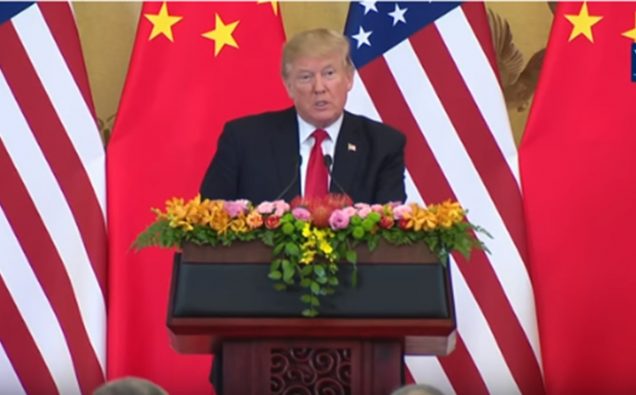
President Trump has made it clear – imports from China will not be a business as usual if a trade deal is not reached.
Trump, who will hold talks with Chinese Vice Premier Liu Hi this week, has vowed to escalate current trade tariff from 10 percent to 25 percent on $200 billion Chinese goods.
U.S. officials say China has backtracked on its commitments to fix unfair trade practices and copyright issues.
Beijing, on the other hand, has threatened to retaliate with tit-for-tat imposition of tariffs on U.S. goods.
The world’s largest economies are scheduled to hold high-stakes talks in Washington Thursday.
Both have sent mixed messages.
On the eve of talks, President Trump has said $100 billion in trade tariffs on Chinese products would be good for America and hurt the Chinese.
….Guess what, that’s not going to happen! China has just informed us that they (Vice-Premier) are now coming to the U.S. to make a deal. We’ll see, but I am very happy with over $100 Billion a year in Tariffs filling U.S. coffers…great for U.S., not good for China!
— Donald J. Trump (@realDonaldTrump) May 8, 2019
The U.S. stork markets have responded to President Trump’s trade tariff threat with a plunge, sending financial shock waves.
So, what will happen, if Washington and Beijing go for new tariffs on imports?
For Beijing, the failure to reach a trade deal will certainly be a setback as the prospect of loss in exports turning into reality could reduce its earnings and shrink its GDP growth.
In the U.S. investors are watching anxiously as the stocks tumble.
Yet, a piece in The New York Times says the U.S. markets have not been all that jittery because of what writer Neil Irwin calls ‘Trump Put’ – a kind of option security that protects investors against further losses.
“In his 28 months in office, Mr. Trump has created a sense in markets that he will play that role for the economy as a whole. His administration has followed through on some of his threats — applying tariffs on many steel and aluminum imports, the existing tariffs on Chinese imports that Mr. Trump threatened to expand on Sunday — but has backed off whenever markets and the economy have looked soft,” Irwin writes.
Despite the U.S. economy being in great shape, Trump would not want to see any economic gains taper off ahead of his 2020 reelection bid. He is aware that he has to perform a delicate balancing act between keeping the economic gains intact and making political capital out of economic performance on his watch.
China may also have political considerations as suggested by Trump in a tweet.
The reason for the China pullback & attempted renegotiation of the Trade Deal is the sincere HOPE that they will be able to “negotiate” with Joe Biden or one of the very weak Democrats, and thereby continue to ripoff the United States (($500 Billion a year)) for years to come….
— Donald J. Trump (@realDonaldTrump) May 8, 2019
Meanwhile, according to a Bloomberg report, Goldman Sachs and JP Morgan the odds currently look greater that higher tariffs will take effect.
In pure economic terms, Moody’s Analytics economists – as cited in the Times report- estimate that a trade war – if it goes into effect – would take away 1.8 percentage points from G.D.P. growth and also cause a rise in unemployment.
But nothing is clear at this point. Trump has a mix of political and economic implications to grapple with while China may be buying time to protect its trade advantages.














